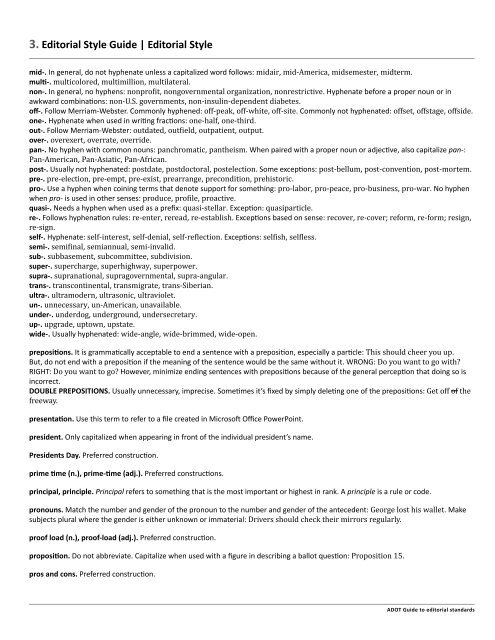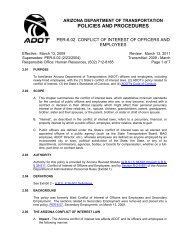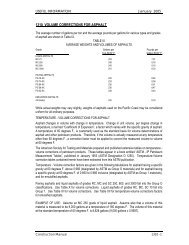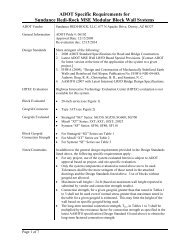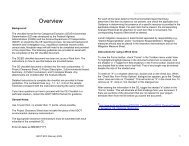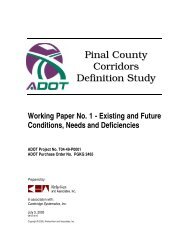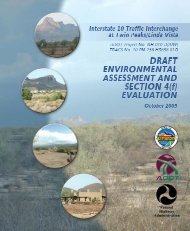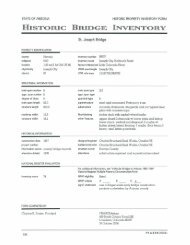ADOT Editorial Style Guide - Arizona Department of Transportation
ADOT Editorial Style Guide - Arizona Department of Transportation
ADOT Editorial Style Guide - Arizona Department of Transportation
You also want an ePaper? Increase the reach of your titles
YUMPU automatically turns print PDFs into web optimized ePapers that Google loves.
3. <strong>Editorial</strong> <strong>Style</strong> <strong>Guide</strong> | <strong>Editorial</strong> <strong>Style</strong><br />
mid-. In general, do not hyphenate unless a capitalized word follows: midair, mid-America, midsemester, midterm.<br />
multi-. multicolored, multimillion, multilateral.<br />
non-. In general, no hyphens: nonpr<strong>of</strong>it, nongovernmental organization, nonrestrictive. Hyphenate before a proper noun or in<br />
awkward combinations: non-U.S. governments, non-insulin-dependent diabetes.<br />
<strong>of</strong>f-. Follow Merriam-Webster. Commonly hyphened: <strong>of</strong>f-peak, <strong>of</strong>f-white, <strong>of</strong>f-site. Commonly not hyphenated: <strong>of</strong>fset, <strong>of</strong>fstage, <strong>of</strong>fside.<br />
one-. Hyphenate when used in writing fractions: one-half, one-third.<br />
out-. Follow Merriam-Webster: outdated, outfield, outpatient, output.<br />
over-. overexert, overrate, override.<br />
pan-. No hyphen with common nouns: panchromatic, pantheism. When paired with a proper noun or adjective, also capitalize pan-:<br />
Pan-American, Pan-Asiatic, Pan-African.<br />
post-. Usually not hyphenated: postdate, postdoctoral, postelection. Some exceptions: post-bellum, post-convention, post-mortem.<br />
pre-. pre-election, pre-empt, pre-exist, prearrange, precondition, prehistoric.<br />
pro-. Use a hyphen when coining terms that denote support for something: pro-labor, pro-peace, pro-business, pro-war. No hyphen<br />
when pro- is used in other senses: produce, pr<strong>of</strong>ile, proactive.<br />
quasi-. Needs a hyphen when used as a prefix: quasi-stellar. Exception: quasiparticle.<br />
re-. Follows hyphenation rules: re-enter, reread, re-establish. Exceptions based on sense: recover, re-cover; reform, re-form; resign,<br />
re-sign.<br />
self-. Hyphenate: self-interest, self-denial, self-reflection. Exceptions: selfish, selfless.<br />
semi-. semifinal, semiannual, semi-invalid.<br />
sub-. subbasement, subcommittee, subdivision.<br />
super-. supercharge, superhighway, superpower.<br />
supra-. supranational, supragovernmental, supra-angular.<br />
trans-. transcontinental, transmigrate, trans-Siberian.<br />
ultra-. ultramodern, ultrasonic, ultraviolet.<br />
un-. unnecessary, un-American, unavailable.<br />
under-. underdog, underground, undersecretary.<br />
up-. upgrade, uptown, upstate.<br />
wide-. Usually hyphenated: wide-angle, wide-brimmed, wide-open.<br />
prepositions. It is grammatically acceptable to end a sentence with a preposition, especially a particle: This should cheer you up.<br />
But, do not end with a preposition if the meaning <strong>of</strong> the sentence would be the same without it. WRONG: Do you want to go with?<br />
RIGHT: Do you want to go? However, minimize ending sentences with prepositions because <strong>of</strong> the general perception that doing so is<br />
incorrect.<br />
DOUBLE PREPOSITIONS. Usually unnecessary, imprecise. Sometimes it’s fixed by simply deleting one <strong>of</strong> the prepositions: Get <strong>of</strong>f <strong>of</strong> the<br />
freeway.<br />
presentation. Use this term to refer to a file created in Micros<strong>of</strong>t Office PowerPoint.<br />
president. Only capitalized when appearing in front <strong>of</strong> the individual president’s name.<br />
Presidents Day. Preferred construction.<br />
prime time (n.), prime-time (adj.). Preferred constructions.<br />
principal, principle. Principal refers to something that is the most important or highest in rank. A principle is a rule or code.<br />
pronouns. Match the number and gender <strong>of</strong> the pronoun to the number and gender <strong>of</strong> the antecedent: George lost his wallet. Make<br />
subjects plural where the gender is either unknown or immaterial: Drivers should check their mirrors regularly.<br />
pro<strong>of</strong> load (n.), pro<strong>of</strong>-load (adj.). Preferred construction.<br />
proposition. Do not abbreviate. Capitalize when used with a figure in describing a ballot question: Proposition 15.<br />
pros and cons. Preferred construction.<br />
<strong>ADOT</strong> <strong>Guide</strong> to editorial standards


